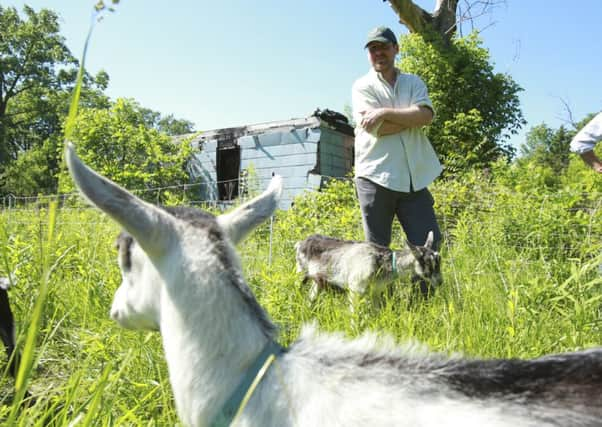Detroit hedges its bets on the goats


Mark Spitznagel, 43, the founder of the $6 billion (£3.6bn) hedge fund Universa Investments, last week brought 20 goats to graze among abandoned homes and general detritus in Brightmoor, one of the Michigan city’s most blighted neighbourhoods.
Not to be outdone by JPMorgan Chase, America’s biggest bank, which recently pledged to invest $100 million (£60m) to help the former centre of the US car industry over the next five years, Spitznagel says he is contributing directly to the community.
Advertisement
Hide AdAdvertisement
Hide Ad“It’s an urban farming experiment,” he said of his plan to leave his goats to roam and munch on overgrown grass. “Goats are an effective way to do landscaping,” he added.
The goats – which will number as many as 60 this summer – have come from Spitznagel’s farmstead, Idyll Farms, in Northport, Michigan. When he is not managing investments for his 15 or so clients, which include institutions and sovereign wealth funds, he tends to a business rearing goats and making cheese.
He will enlist the help of the community – paying unemployed adults and enlisting the help of local youths to herd the baby goats – and he plans to build portable housing for the goats in addition to pens and electric fencing.
At the end of the summer, Spitznagel said, he will sell the goats to Detroit butchers and give the proceeds back to the community.
If the goats are allowed to stay, that is. On Friday the goat grazing operation had hit a snag.
Harry Ward, the head of Detroit’s animal control had been alerted to the grazing goats after reading an article in the New York Times.
Ward said he had been prepared to seize the goats but after assessing the situation, determined that they had adequate food and shelter.
He gave the goats – and their caretakers – until tomorrow to leave the neighbourhood; they will be seized otherwise.
Advertisement
Hide AdAdvertisement
Hide Ad“On Monday, if they are still there at noon, we will seize and ticket the goats,” he said. Spitznagel would be fined $500 (£300) for each goat, he added.
Stefan Prelog, a spokesman for Spitznagel, said they were keen to find a way around this and press ahead with the project.
“We have an alignment of interests with the Brightmoor community in revitalising it around urban farming. Hopefully the city can get that”, he said.
If this all sounds a little unusual, Spitznagel has never been one to bow to convention.
He began his career in a trading pit at the Chicago Board of Trade, where he first toyed with the idea of learning to “invest in loss”. Ever the fearmonger, he says the stock market is in for a great shock that will set off devastating across-the-board losses.
Until then, he is paying for the option to short the market, losing money each time he does so.
The last boon he received was during the financial crisis: in 2008 his fund returned 115 per cent amid wide market carnage.
Residents of Brightmoor may hope that Spitznagel’s mantra to “invest in loss” will pan out better for Detroit than it has for his hedge fund recently.
So far this year his firm has lost 1 per cent.